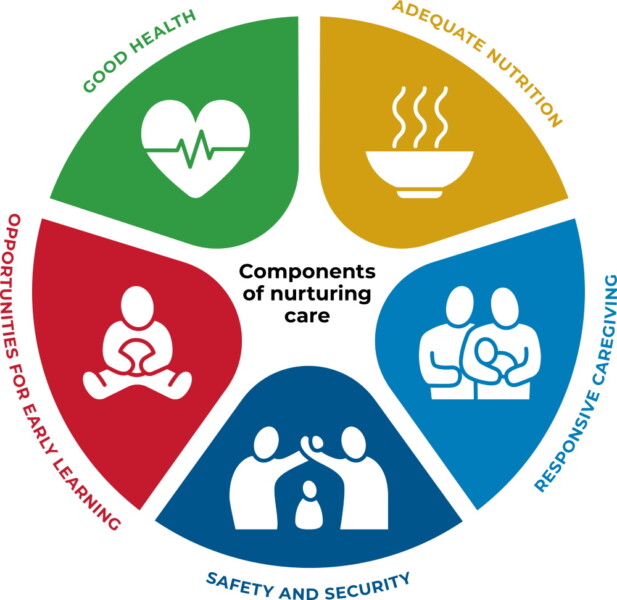
In 2016, an estimated 249 million children under the age of five years were at risk for developmental failure due to early life exposure to poverty, undernutrition, diseases, and lack of adequate nurturing (Lu et al., 2016). These children – who are primarily from Sub-Saharan Africa and South Asia – are likely to have inadequate physical and cognitive development, do poorly in school, have lower income, and provide fewer resources towards the growth and development of their own children (Grantham McGregor et al., 2007).
The conceptual basis for developmental failure is anchored in the widely accepted “fetal origins” hypothesis (Barker 1990, 1995) which links conditions in utero and during early childhood with later life outcomes. Malnutrition, infection, pregnancy, birth complications, and under-stimulation during the first 2-3 years of life can have lasting impact on health, cognitive, and economic outcomes well into old age (Almond and Currie, 2011).
The long-term effects manifest through multiple pathways. Inadequate nutrition or repeated episodes of infections can hinder physical growth and reduce adult stature, which in turn has been linked with worse socioeconomic outcomes (Behrman et al., 2009). Because children attain 80-90% of their adult brain size within the first three years of life, inadequate growth and cognitive stimulation during this time can have a lifelong effect (Grayson and Fair, 2019 , Fox et al., 2010). This model has been validated by several trial and observational studies in different settings, and forms a part of the so called “nurturing care” framework (Figure 1) for early childhood which focuses on good health, adequate nutrition, security and safety, opportunities for early learning, and responsive caregiving (Currie and Vogl., 2013, Almond et al., 2018, WHO, 2018, Almond and Currie, 2011). Evidence suggests that conditional upon the environment, girls have some developmental advantages over boys during the first few years of life, although socioeconomic conditions, gender attitudes, and social norms determine much of children’s longer-term human capital formation trajectories (Lutchmaya and Baron-Cohen, 2002, Connellan et al.,2000, Barbu et al., 2011).
Fig. 1: The nurturing care framework of early childhood development (Source: Nurturing Care)
Early learning is one of the key components of the nurturing care framework. Globally, a large body of evidence shows that early childhood education (ECE) – typically provided during the ages of 3-5 years – can substantially improve children’s language and cognitive skills. Evaluation studies of more than a dozen preschool programs in the US estimated that enrolled children had 3-9 months of learning gains in terms of reading, writing, and mathematical reasoning and problem-solving capabilities as compared with non-enrolled children (Meloy et al., 2019). Another study examined the link between preschool attendance and Programme for International Student Assessments (PISA) 2018 test scores in 73 middle- and high-income countries (Richter et al., 2021). The authors found that after adjusting for children’s socioeconomic characteristics, one and two years of pre-primary education was associated with 0.1 and 0.22 standard deviation higher mathematics test scores respectively by age 15. The estimated effect was almost the same for science test scores. Literacy and numeracy outcomes were not examined separately in this study. A recent UNICEF report estimated that children attending ECE programs in 48 low- and middle-income countries (LMICs) were 27 percentage points more likely to be on track for developing age-appropriate literacy and numeracy skills as compared to non-attending children, and the benefits were larger in poorer countries (UNICEF, 2019). These benefits are especially relevant in the context of the ongoing learning crisis in LMICs. Learning poverty in LMICs, i.e., the inability of 10-year-old children to read and understand simple text, has increased from around 50% in 2015 to 70% following the COVID-19 pandemic (World Bank, 2022). Universal ECE can help reduce learning poverty by improving children’s foundational literacy and numeracy skills.
In addition to improving school readiness, ECE can also provide longer-term educational and economic benefits. Adults who originally benefited from US preschool programs in the 1970s and 1980s such as Head Start and Perry are estimated to have higher wages than non-beneficiaries (Bartik, 2014). In the context of LMICs, a trial study of psychosocial stimulation among Jamaican toddlers in the 1980s has been linked with 20% wage gain in later life, and an early childhood development program in India has been linked with 0.1-0.3 extra years of schooling in adulthood (Gertler et al., 2014, Nandi et al., 2020). The lack of evidence on the long-term effects of preschool in LIMCs can be attributed to the paucity of high-quality study settings and data, confounding factors such as responsive parenting and selective human capital investments, and low access to preschool.
Despite its tremendous benefits, ECE provision and enrollment remain low in LMICs. Only about half of world’s pre-primary age children receive any form of preschool education, and in low-income countries, less than a quarter of children are enrolled (UNICEF, 2019). There are also substantial regional and socioeconomic gaps in preschool attendance. Across world regions, ECE enrollment rates remain the lowest in sub-Saharan Africa and South Asia. Although Target 4.2 of the Sustainable Development Goals (SDGs) recommends that all children should receive at least one year of preschool education, legal mandates for ECE exists in only 14 LMICs (Richter et al., 2021, UNESCO, 2019). On this International Literacy Day, let us realize that universal foundational literacy and numeracy skills among children cannot be achieved without universal access to quality preschools.
Gender in Early Childhood Education: Addressing Inequalities in Opportunity and Pedagogy
Watch Arindam Nandi speak on the gender gaps in pre-school enrollment in India.

